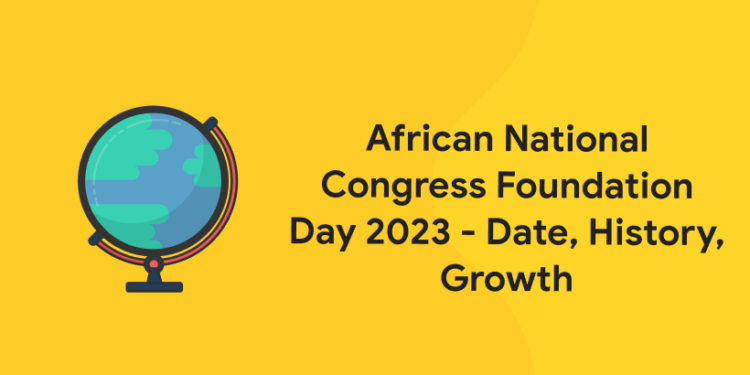Table of Contents
African National Congress Foundation Day is observed on January 8 every year. On this day, the Africans fought for their rights with spears in their hand against British and Boer colonisers. The ANC considers this day as a struggle for freedom and justice. The goal of this day is to unite the Africans and lead the battle for political, social and economic change. Read below to learn more of African National Congress Foundation Day 2023.
Download Entri to Get The Latest Job Updates!
African National Congress Foundation Day – Date
African National Congress (ANC) was formed on 8 January 1912. The Celebration of African National Congress Foundation Day is observed on January 8 every year. The unification of Africans and the defence of their liberties and rights were its main objectives.
Formation of African National Congress
1: Who was the first woman President of India?
The African National Congress (ANC) is a social-democratic political party in South Africa. It has been in power since April 1994 and has been reelected every year since 2004. Cyril Ramaphosa, the current President of South Africa, has been the president of the ANC since 18 December 2017.
The African National Congress was founded on January 8, 1912 by John Langelibalale Dube with the motive of eliminating apartheid and giving full voting rights to black South Africans and mixed-race South Africans. The aim was to bring all Africans together as one people to defend their rights and freedom. The chiefs, representatives of people and church organizations and other prominent individuals gathered in Bloemfontein and formed the African National Congress. It was formerly known as the South African Native National Congress (SANNC) and was renamed the ANC in 1923. Initially, the ANC resorted to the use of delegations, petitions and non-violent protests to end apartheid; however, after the Sharpeville massacre in March 1960, where 69 black South Africans were shot and killed by police and hundreds wounded during a peaceful protest; they had to change their approach. In 1940, Alfred B. Xuma became ANC president and began to recruit more outspoken and younger members like Nelson Mandela, Oliver Tambo, and Walter Sisulu.
During the initial days, the ANC had it’s share of problems due to power struggles and lack of resources but the increasing repression by the government forced the ANC to join hands with the SACP and as a result formed military wing, uMkhonto we Sizwe (Spear of the Nation/ MK) in 1961.
Free UPSKILLING Courses!
Take your first step toward mastering in-demand skills, acing interviews, and securing top-tier jobs with Entri's free upskilling courses.
Start Learning!Growth of African National Congress
Even though it was formed in 1912, ANC’s membership increased rapidly in the 1950s when the blacks of South Africa could no longer tolerate the policy of rigid racial segregation implemented by the white minority government in 1948. In 1955, the ANC issued its famous Freedom Charter, which stated, “South Africa belongs to all who live in it, black and white”. Since then the ANC had been in continuous revolt against the government. In 1960, there was a ban on ANC after the Sharpeville massacre. In 1961, the ANC officially adopted violence with the formation of a Umkhonto we Sizwe. As a result Nelson Mandela and Walter Sisulu were sentenced to life imprisonment for their ANC activities and Oliver Tambo left South Africa to establish an external wing of the ANC. With much of its leadership either jailed or exiled, the ANC went underground and began guerilla activities from bases abroad. In 1990, the government lifted its ban on the ANC and other Black African organizations. Apart from this, the blacks of South Africa had another reason to rejoice – Mandela was released in the same year after more than 27 years in prison. The ANC no longer had to operate underground and started their preparations for the upcoming election.
The ANC Sights Victory
In 1994 the party swept the country’s first elections and Nelson Mandela became South Africa’s first black President. This saw the collapse of apartheid and the ushering in of new democratic rule in 1994. Mandela formed a government of national unity. He was earlier chosen as the president of ANC in 1991 and played a prominent role in leading the party to victory. Mandela retired in 1999 after just one term. Thabo Mbeki succeeded Mandela as head of the ANC in 1997 and as president of South Africa in 1999. As a result of failure of South Africa’s economic growth, there were tensions within the ANC which led to Mbeki’s loss of the party leadership to Jacob Zuma in 2007 and his resignation as South Africa’s president in 2008. ANC deputy leader Kgalema Motlanthe was elected South Africa’s interim president. Zuma succeeded Motlanthe as South Africa’s president in 2009. His tenure caused increasing divisions in the ANC, as his administration faced charges of corruption and growing economic difficulties. In 2017 Cyril Ramaphosa, who had been Mandela’s choice as his successor, was elected to succeed Zuma as ANC president.
African National Congress’s Fight Against Apartheid
The ANC has succeeded in shaping a multi cultural government in South Africa, and under Nelson Mandela brokered the end of apartheid thus bringing peace to a racially divided country. Despite his recognition as the major force in abolishing apartheid, Mandela always maintained that he was not responsible for this accomplishment. On his release from prison in 1990, he said, “I stand here before you not as a prophet but as a humble servant of you, the people. Your tireless and heroic sacrifices have made it possible for me to be here today. I therefore place the remaining years of my life in your hands.” He reckoned that the achievement was due to the relentless effort of the African National Congress (ANC).
Free UPSKILLING Courses!
Take your first step toward mastering in-demand skills, acing interviews, and securing top-tier jobs with Entri's free upskilling courses.
Start Learning!African National Congrss Foundation Day Quiz 2023
1. When was South African Native National Congress founded?
a) 8 January 1912
b) 24 May 1893
c) 17 August 1909
d) 6 December 1899
2. Where was South African Native National Congress founded?
a) Pretoria
b) Cape Town
c) Bloemfontein
d) Bizana
3. When was African National Congress banned?
a) 23 March 1960
b) 15 April 1948
c) 31 July 1939
d) 7 October 1936
4. Who was African National Congress’ president in 1969-1991?
a) Robert Sobukwe
b) Oliver Tambo
c) Mangosuthu Buthulezi
d) Winifred Madikizela
5. When did South African Native National Congress change its name to African National Congress?
a) 1900
b) 1923
c) 1914
d) 1910













